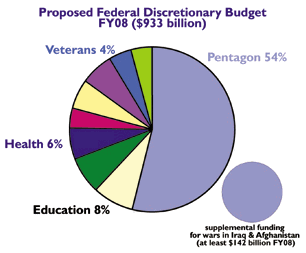|
News & Views item - December 2007 |
![]() If We Keep Doing Business as Usual, We’re Going to Get Our Lunch Eaten
-- MIT Former President Charles Vest.
If We Keep Doing Business as Usual, We’re Going to Get Our Lunch Eaten
-- MIT Former President Charles Vest.
 The
America COMPETES Act, with strong bipartisan US Congressional support
was signed into law by President George W Bush this past August. At the
time it was thought by the scientific community to mean significant
federal support for increasing basic research to allow the US to
maintain its competitive lead.
The
America COMPETES Act, with strong bipartisan US Congressional support
was signed into law by President George W Bush this past August. At the
time it was thought by the scientific community to mean significant
federal support for increasing basic research to allow the US to
maintain its competitive lead.
They thought wrong.
On December 19 the US Congress in deciding the actual allocation of US$555 billion dealt fundamental research a hiding.
The expected move toward doubling funding at the National Science Foundation (NSF) and the Office of Science of the Department of Energy (DOE) -- wiped.
"It’s dead in this budget," Samuel Rankin, Washington DC office director for the American Mathematical Society and chair of the Coalition for National Science Funding told Nature. He hoped next year's budget might bring a resurrection.
The National Science Foundation saw its R&D funding grow 1%, to $4.5 billion — not the 8% rise requested by President Bush.
The National Institutes of Health (NIH) got an 0.5% increase less than one-sixth of that Congress had sought in an earlier, unsuccessful bill. The US$133 million increase, will make 2008 the fifth consecutive year of effectively flat funding for the NIH.
With regard to high energy physics: "This is probably the worst budget for science that anyone can remember," according to Michael Lubell, a spokesman at the American Physical Society in Washington DC. "It absolutely devastates and probably wipes out American high-energy physics."
Congress withheld money for the Department of Energy's US$160-million commitment to ITER, the international fusion reactor in France, and slashed funding for the International Linear Collider (ILC), the next-generation particle accelerator, from US$60 million to US$15 million. Most of the ILC money would have gone to Fermilab in Batavia, Illinois.
As a result of the 75% funding cut Nature reports: "The lab also saw its NOνA neutrino experiment programme eliminated. Fermilab’s director, Pier Oddone, told his staff to expect 200 lay-offs in the spring (from a 1,900-person workforce), along with mandatory unpaid leave for remaining employees. The lab may even temporarily shut down its Tevatron accelerator."
Then there was the squandering of funds resulting from the fixation on what might be called injecting humans into space.
NASA got a 5.7% increase in its overall R&D budget, to US$12.5 billion; however, much will go toward completing the International Space Station and for rockets to fly astronauts to the Moon. Nevertheless, Earth sciences received a 4.4% increase, to US$1.5 billion, but planetary science suffered a 1.4% cut, to $1.4 billion.
However, not all the news was bad.
Research and development (R&D) money for renewables, energy efficiency and nuclear energy increased 30%, to nearly US$1.3 billion, calculates American Association for the Advancement of Science budget analyst Kei Koizumi.
The bill also boosts funding for clean coal and other fossil-fuel R&D activities by 13%, to $557 million.
Getting back to the immediate past president of MIT, Charles Vest, now president of the National Academy of Engineering, commented that other countries are proceeding apace with research investments and then... "If we keep doing business as usual," he says, "we’re going to get our lunch eaten."
Whether or not Charles Vest's comment and the US government's lack of commitment to fundamental research and the enabling sciences will find a usefully proactive audience in Australia's Rudd government... we'll just have to wait and see.